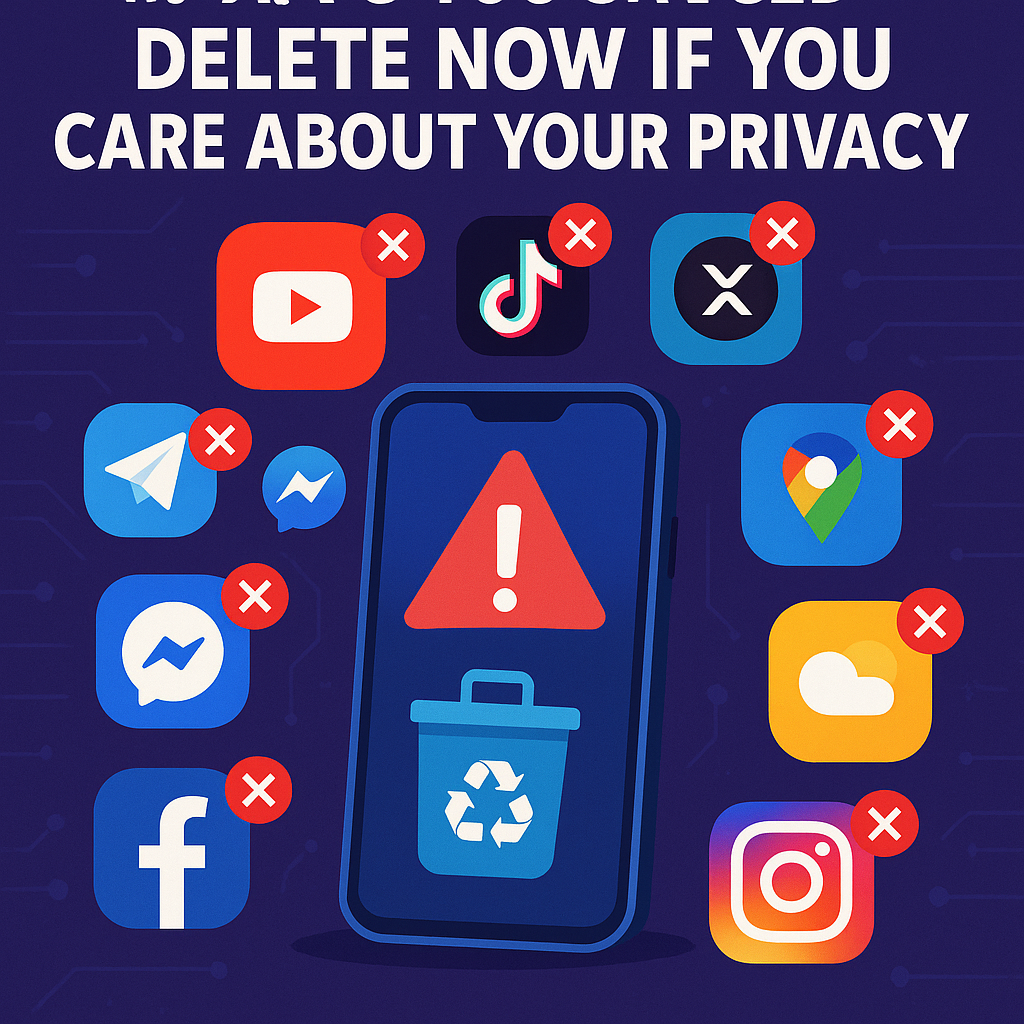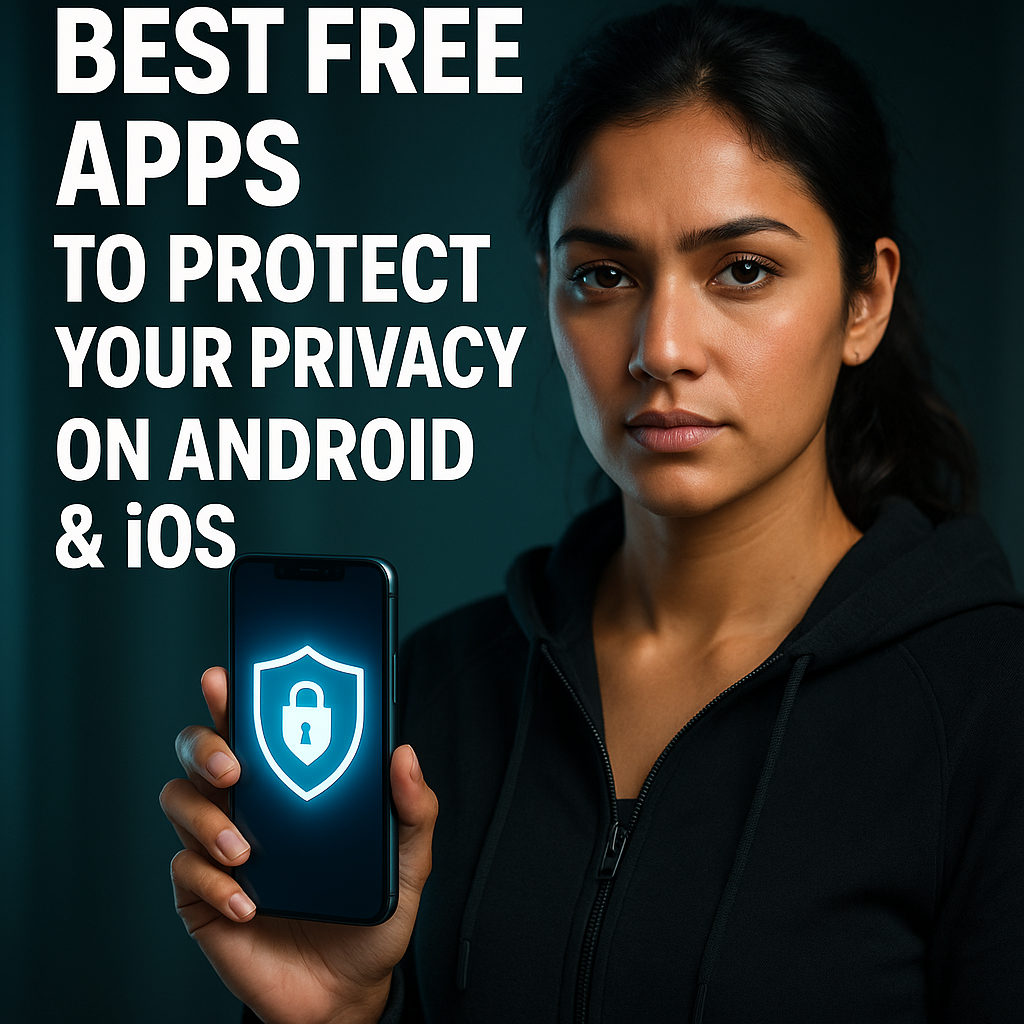🔥 10 Apps You Should Delete Now If You Care About Your Privacy (2025)
 By The Security Planet
By The Security Planet

Your phone might be spying on you — and you’re the one who let it in. In 2025, digital surveillance is no longer just a government-level issue. Your apps are tracking you 24/7, even when you’re asleep or not using them. Here are the worst offenders — and what you should use instead.
App Categories to Delete for Better Privacy
1. Facebook
Facebook isn’t just a social network; it’s one of the most sophisticated data-harvesting machines ever built. Its entire business model relies on knowing as much about you as possible to sell hyper-targeted ads. It collects data not just from your activity on the app, but from your behavior across the entire internet via trackers embedded in other websites and apps.
What it collects:
- Contacts and call logs: It pressures you to upload your address book to “find friends.”
- Location history: Tracks where you go, even when the app is in the background.
- Messages: Scans messages for content and even logs drafts you never sent.
- Face recognition data: Builds a biometric map of your face from photos you or your friends upload.
- Browsing habits: The Facebook Pixel tracks you on millions of websites.
🔐 Better alternative: For essential access, use Facebook strictly through a desktop browser. Install privacy extensions like uBlock Origin and the Facebook Container for Firefox to isolate its tracking.
2. TikTok
TikTok’s privacy concerns are significant and have led to it being banned on government devices in numerous countries. The app’s data collection is notoriously aggressive, and its connection to its Chinese parent company, ByteDance, raises serious questions about where that data ultimately ends up.
What it collects:
- Keystrokes and clipboard access: Has been shown to monitor what you type and copy.
- Device & network information: Your IP address, location, unique device identifiers.
- Biometric data: Face and voiceprints are collected from the videos you create and watch.
- Behavioral tracking: Uses accelerometer data to track your physical movements and rhythms.
🔐 Better alternative: There is no truly private alternative that offers the same experience. If you must use it, do so via a web browser to limit its access to your device’s sensors and data.
3. CamScanner
An app that scans documents seems harmless, but CamScanner was famously caught embedding malware in its Android app in 2019, which installed a Trojan on user devices. While it was cleaned up, the incident revealed a disregard for user security. The app still requests more permissions than a simple document scanner should need.
What it does:
- Sends your scanned documents (which could be IDs, contracts, or private notes) to its own cloud servers by default.
- Can be aggressive with advertisements and upselling.
- Has a history of security vulnerabilities.
🔐 Better alternative: Microsoft Lens and Adobe Scan are excellent, secure options from trusted companies. They integrate well with other services and have clear privacy policies.
4. Free VPNs (like TurboVPN, Hola VPN)
Free Virtual Private Networks are one of the biggest privacy paradoxes. They promise to protect your data but often do the exact opposite. Running a secure VPN service is expensive, and these “free” providers cover their costs by monetizing your data.
What they do:
- Log your activity: They record the websites you visit and sell this data to advertisers.
- Sell your bandwidth: Hola VPN was famously caught turning its users into a massive botnet, allowing others to use their internet connection.
- Inject ads and malware: Some free VPNs inject their own ads into your browsing or even bundle malware.
🔐 Better alternative: A paid, independently audited, zero-log VPN is the only way to go. Look at services like Mullvad, ProtonVPN, or IVPN.
5. Most Weather Apps
It’s just a weather forecast, right? Wrong. Weather apps are notorious data brokers. They trade a free forecast for access to your precise, real-time location, which they then sell to a complex ecosystem of advertisers, hedge funds, and data firms.
What they collect:
- Your exact GPS location history, often collected even when the app is closed.
- Unique device identifiers to track you across different apps.
- This data is sold to build profiles that can infer where you live, work, and shop.
🔐 Better alternative: Use your phone’s built-in weather widget. If you need a dedicated app, use one from a trusted source like The Weather Channel and set location permissions to “Only while using the app.”
6. Flashlight Apps
A relic from the early days of smartphones, these apps are a classic example of permission overreach. Your phone has a built-in flashlight that requires no app. Any standalone flashlight app is, at best, redundant and, at worst, a shell for adware and data trackers.
What they usually request:
- Microphone, contacts, storage, and camera access—none of which are needed for a flashlight.
- The ability to run in the background to track you continuously.
🔐 Better alternative: Use your system’s built-in flashlight, accessible from the control center. No app download is necessary.
7. Face Filter & “Beauty” Apps
These apps are fun, but the cost is often your biometric data. When you use an app like FaceApp, you are sending a detailed map of your face to their servers. The privacy policies are often vague and grant the company broad rights to use your likeness for almost anything, including training AI surveillance models.
What they collect:
- Detailed facial geometry, expressions, and patterns.
- Metadata from your photos (location, time, device).
- They may upload your entire photo library, not just the pictures you edit.
🔐 Better alternative: Use offline photo editors like Snapseed or the native filters within your phone’s gallery app.
8. “Free” Antivirus & Cleaner Apps
Ironically, many apps that promise to protect you are the ones you need protection from. So-called “free antivirus” apps often use scareware tactics, showing fake virus alerts to frighten you into buying a premium version. They also require deep system permissions, which they can abuse to collect data and serve ads.
What they do:
- Use false positives to scare users into unnecessary purchases.
- Overload your phone with ads, slowing it down.
- Request dangerous admin-level privileges that give them total control.
🔐 Better alternative: Your phone already has built-in protection (Google Play Protect for Android). If you need a second opinion, use the mobile version of a reputable desktop antivirus like Malwarebytes.
9. Instagram
If Facebook is a data-harvesting machine, Instagram is its more visually appealing and arguably more invasive sibling. The platform is designed to be an engagement engine, and it fuels this by collecting vast amounts of data to understand your psychology, predict your behavior, and keep you scrolling while serving you hyper-targeted ads and content.
What it collects:
- Everything you do on and off the app, thanks to the Meta Pixel.
- Biometric information from your selfies, videos, and filters.
- Your shopping behavior, mood patterns inferred from your activity, and your full contact list.
- Listens for audio cues via the microphone to trigger ads.
🔐 Better alternative: The web version offers a less invasive experience. Using it in a containerized browser (like Firefox’s Multi-Account Containers) can further limit its tracking.
10. UC Browser
Developed by a subsidiary of Chinese tech giant Alibaba, UC Browser has been flagged for serious security and privacy issues multiple times. Despite its popularity in some regions, research has repeatedly shown that it handles sensitive user data recklessly.
What it leaks:
- Search queries are sent to its servers without encryption.
- Your unique device identifiers (IMEI, MAC address) are transmitted insecurely.
- Location and DNS lookups are sent to remote servers without protection.
🔐 Better alternative: For a secure and private browsing experience, switch to Brave, Firefox Focus (which blocks trackers and deletes history by default), or Tor Browser for maximum anonymity.
Your phone is like your digital home — and these apps are the windows you left wide open.
Removing them won’t make you invisible, but it’s a powerful first step to protect your privacy, your data, and your freedom online.
What to Do If Someone Tries to Access Your Account? A Quick Reaction Guide
What to Do If Someone Tries to Access Your Account? A Quick Reaction Guide What…
The 5 Best Free Apps to Protect Your Privacy on Android & iOS (2025)
The 5 Best Free Apps to Protect Your Privacy on Android & iOS (2025) The…
10 Apps You Should Delete Now If You Care About Your Privacy
🔥 10 Apps You Should Delete Now If You Care About Your Privacy (2025) 🔥…
Is Someone Spying on Your Phone? 5 Clear Signs & What to Do
Is Someone Spying on My Phone? 5 Clear Signs & What to Do Is Someone…
xAI’s Grok Alerts Sam Altman to Security Dangers in Codex with Internet Access: Are We Prepared?
xAI’s Grok Alerts Sam Altman to Security Dangers in Codex with Internet Access: Are We…
Free Basic Cybersecurity Course: Protect Your Digital World
Free Basic Cybersecurity Course: Protect Your Digital World Welcome to the introductory cybersecurity course! In…







